Top Cyber Security Firms for 2025: The Ultimate Global Guide by SNSKIES
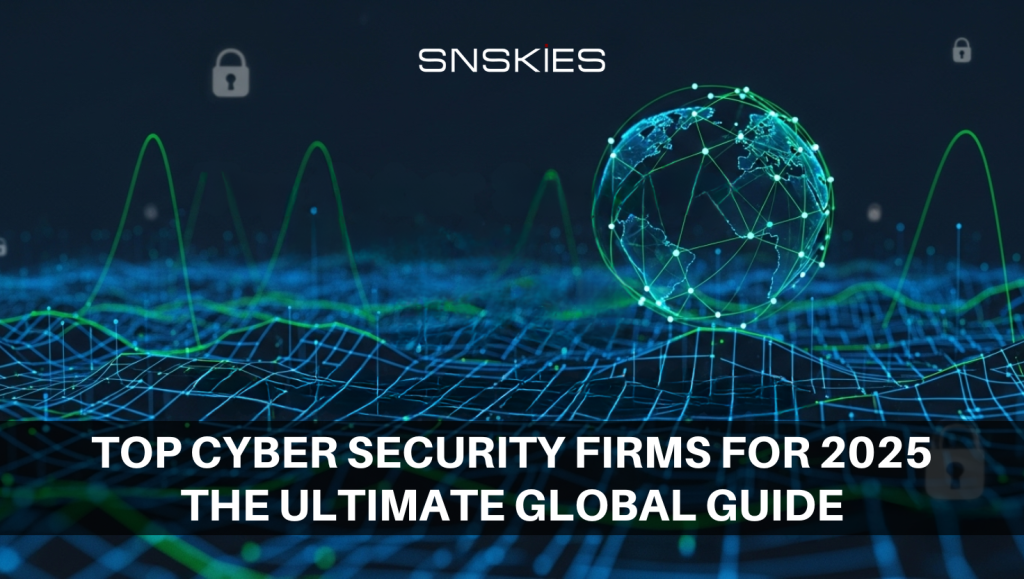
Articles Top-Rated Cyber Security Services in Pakistan – Trusted Specialists for Your Business Articles Top-Rated Cyber Security Services in Pakistan – Trusted Specialists for Your Business Articles July 31, 2025 Understanding the Role of Cyber Security Firms in Today’s Digital World In today’s connected world, where information flows freely across devices and borders, cybersecurity has become the backbone of business security. Cyber security firms act as the digital guardians, protecting organizations from an ever-growing wave of cyber threats such as ransomware, phishing, data breaches, and state-sponsored attacks. Over the past decade, threats have shifted from simple malware infections to highly coordinated, AI-driven attacks that can cripple entire industries. This change has made professional cyber security services a necessity for companies of all sizes. Whether it’s a startup handling customer data or a multinational bank managing billions in transactions, every business needs a layered defense strategy. SNSKIES stands out in this environment by delivering precise, industry-specific protection. The company focuses on understanding a client’s operations, vulnerabilities, and compliance requirements before designing tailored security strategies. Core Services Offered by Leading Cyber Security Firms Threat Detection and Prevention Modern cyber security firms use advanced analytics, intrusion detection systems, and machine learning models to identify threats in real time. SNSKIES continuously monitors network activity, blocking malicious attempts before they cause harm. Incident Response and Recovery No security system is 100% immune, which is why incident response is critical. A skilled team can contain a breach, mitigate damage, and restore operations quickly. SNSKIES offers rapid containment protocols and digital forensics to ensure businesses bounce back stronger. Data Protection and Encryption With cloud storage and remote access becoming standard, data encryption is the cornerstone of security. SNSKIES implements end-to-end encryption to protect sensitive information, whether it’s stored on-site, in the cloud, or in transit. Compliance Management Industries such as healthcare, finance, and manufacturing face strict regulations. Leading cyber security firms help organizations comply with GDPR, HIPAA, and ISO standards without disrupting daily operations. Why the Demand for Cyber Security Firms Is Growing Cyberattacks are no longer limited to large corporations. Small and medium-sized enterprises are increasingly targeted because they often lack robust defenses. Remote work has also expanded the attack surface, with employees accessing sensitive systems from various devices and locations. The financial impact of a cyberattack can be devastating, ranging from direct monetary losses to long-term brand damage. This reality is driving businesses worldwide to partner with professional security firms like SNSKIES. Industry-Specific Cybersecurity Solutions Every industry faces unique security challenges. SNSKIES customizes its approach based on sector-specific risks: Finance and Banking – Protecting against fraud, account takeover, and insider threats. Healthcare – Safeguarding patient records while ensuring compliance with medical data laws. Retail and eCommerce – Preventing payment fraud and securing customer transaction data. Manufacturing – Defending intellectual property and operational technology from sabotage. Trends Shaping the Future of Cybersecurity The cybersecurity landscape is constantly evolving. Some trends expected to dominate in 2025 include: Zero Trust Security Models – Verifying every request, no matter its origin.AI-Driven Threat Intelligence – Using artificial intelligence to predict and prevent attacks. Quantum-Resistant Encryption – Preparing for the future of quantum computing. Cloud-Native Security – Designing protection directly into cloud infrastructure. SNSKIES actively researches and integrates these innovations to ensure its clients are future-ready. Choosing the Right Cyber Security Firm Selecting the right partner is a critical decision for any organization. Here are some key factors businesses should consider: Experience & Reputation – Look for firms with a strong track record. Certifications – Ensure the team holds relevant industry certifications. 24/7 Support – Cyberattacks can happen anytime; round-the-clock support is essential. Tailored Solutions – Avoid one-size-fits-all packages. SNSKIES meets all these criteria, providing flexible, reliable, and highly specialized protection. The Value of Investing in Cybersecurity Cybersecurity is not just a cost — it’s an investment. Businesses that proactively secure their systems avoid costly breaches, legal liabilities, and brand damage. In the long run, this investment strengthens trust with customers and partners. FAQs – Cyber Security Firms What do cyber security firms do? They protect businesses from cyber threats through monitoring, prevention, and response strategies. Are small businesses at risk of cyberattacks? Yes, attackers often target smaller companies due to weaker defenses. How much do cyber security services cost? Costs vary based on the size of the business and complexity of the systems. What is the most common cyber threat today? Ransomware and phishing remain the most prevalent global threats. How often should a business review its cybersecurity strategy? At least annually, or whenever major system changes occur. Recent Post All Posts Articles Top Cyber Security Firms for 2025: The Ultimate Global Guide by SNSKIES August 11, 2025/ What Certifications Should I Get for Cyber Security? | SNSKIES Global Guide 2025 August 5, 2025/ Top-Rated Cyber Security Services in Pakistan – Trusted Specialists for Your Business July 31, 2025/ Older Posts
What Certifications Should I Get for Cyber Security? | SNSKIES Global Guide 2025
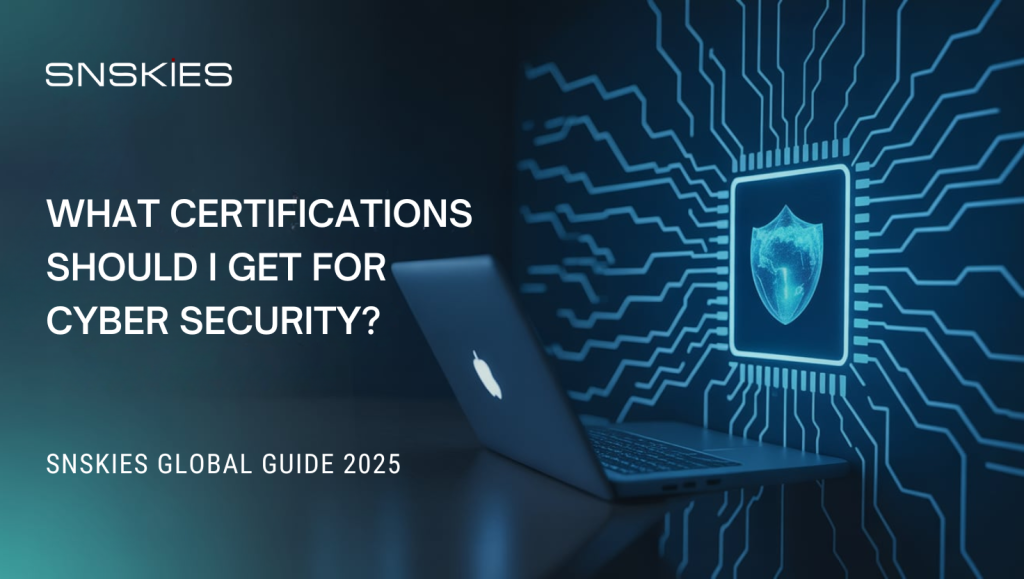
Articles What Certifications Should I Get for Cyber Security? | SNSKIES Global Guide 2025 Articles What Certifications Should I Get for Cyber Security? | SNSKIES Global Guide 2025 Articles August 5, 2025 Introduction As digital threats evolve, cybersecurity certifications have become essential to staying competitive and secure. Whether you’re launching your career or progressing into advanced roles, knowing what certifications you should get for cybersecurity is the key to long-term success. SNSKIES, an ISO-certified organization, delivers enterprise-grade cybersecurity, cloud transformation, systems integration, and professional services across regions including Pakistan, UAE, East Africa, and Europe. With globally certified professionals and international security standards at its core, SNSKIES is a trusted partner for secure digital transformation worldwide. SNSKIES Global Business Sectors 1. Cybersecurity Operations & Incident Response Operating a 24/7 Managed Security Operations Center (MSOC), SNSKIES provides: Real-time threat detection Incident handling & response Digital forensics Intrusion prevention & endpoint protection 2. Cloud Transformation & DevSecOps SNSKIES enables clients to transition securely to the cloud through: Cloud posture assessmentsDevSecOps lifecycle security Hybrid-cloud deployment strategies 3. Systems Integration & Infrastructure From data centers to SD-WAN, SNSKIES builds secure, resilient infrastructure through: Network design & segmentation Secure converged systems High-performance IT ecosystems 4. Certified Expertise & Global Standards As an ISO 27001:2013-certified company, SNSKIES ensures its solutions and services align with international security governance. All services are delivered by professionals certified in Security+, CISSP, CEH, OSCP, CCSP, and other globally recognized standards—ensuring enterprise-level security, compliance, and trust. What Certifications You Should Get for Cybersecurity Professionals aiming to align with global security standards and companies like SNSKIES can follow this strategic certification roadmap: Entry-Level Certifications CompTIA Security+ Covers: Network security, risk management, compliance Ideal For: SOC analysts, IT support, junior security roles CompTIA CySA+ Focus: Threat detection, analytics, and incident response Ideal For: Security Operations Center (SOC) professionals Offensive & Technical Certifications Certified Ethical Hacker (CEH) Focus: Penetration testing, threat hunting, ethical hacking Matches Roles: Red team, vulnerability assessment Offensive Security Certified Professional (OSCP) Known For: Hands-on live environment testing Matches Roles: Advanced penetration testers, threat hunters Governance, Risk & Compliance Certifications CISSP Covers: Security architecture, policy, and operationsBest For: Managers, CISOs, and strategy leads CISM Focus: Risk governance, strategic alignment Best For: IT governance and compliance professionals CISA Focus: Auditing, control frameworks, regulatory assurance Best For: Auditors, internal risk reviewers CRISC Covers: Enterprise risk and control frameworks Best For: GRC roles, policy compliance professionals Cloud & Advanced Security Certifications CCSP Focus: Cloud infrastructure and governance Ideal For: Cloud engineers, security architects GIAC Certifications (e.g., GCIH, GCFA) Topics: Incident handling, forensics, blue team defense Ideal For: Analysts, investigators, incident responders Emerging & Role-Specific Certifications ISACA CCOA (Cybersecurity Operations Analyst) Released in 2025 for SOC analysts Focuses on detection workflows, response skills ISACA AAISM (Advanced AI Security Management) In development For professionals managing AI-based security risk Conclusion: Follow Certified Paths, Secure Global Careers In a world where security risks are evolving rapidly, being certified isn’t just an advantage—it’s a necessity. Whether you’re aiming to work with top-tier firms like SNSKIES or seeking a globally mobile career, your certification path should reflect the standards, resilience, and strategic insight demanded by the industry. SNSKIES sets the benchmark by operating with certified professionals and ISO standards across all its services in Pakistan, the UAE, East Africa, and Europe—ensuring global-grade protection, trust, and innovation. FAQs What certifications are held by professionals at SNSKIES? SNSKIES employs globally certified experts, holding credentials such as CompTIA Security+, CISSP, CEH, OSCP, CCSP, and more—ensuring international compliance and capability across all service domains. What’s the best cybersecurity certification to start with? CompTIA Security+ is the top foundational choice for those new to cybersecurity. It provides a solid base for network security, access control, and compliance frameworks. Which certifications are ideal for penetration testing or red teaming? CEH and OSCP are industry-standard certifications that validate practical skills in ethical hacking and exploitation methodologies. Which certifications support leadership roles in cyber governance? For those seeking strategy, audit, or compliance roles, certifications such as CISSP, CISM, CISA, and CRISC offer the governance expertise required by global firms like SNSKIES. Is SNSKIES itself certified? Yes. SNSKIES is ISO 27001:2013 certified, demonstrating compliance with international information security standards, best practices, and regulatory frameworks. Recent Post All Posts Articles What Certifications Should I Get for Cyber Security? | SNSKIES Global Guide 2025 August 5, 2025/ Top-Rated Cyber Security Services in Pakistan – Trusted Specialists for Your Business July 31, 2025/ Top SOC Vendors as a Service Providers for Businesses (2025 Guide) July 29, 2025/ Older Posts
Top-Rated Cyber Security Services in Pakistan – Trusted Specialists for Your Business
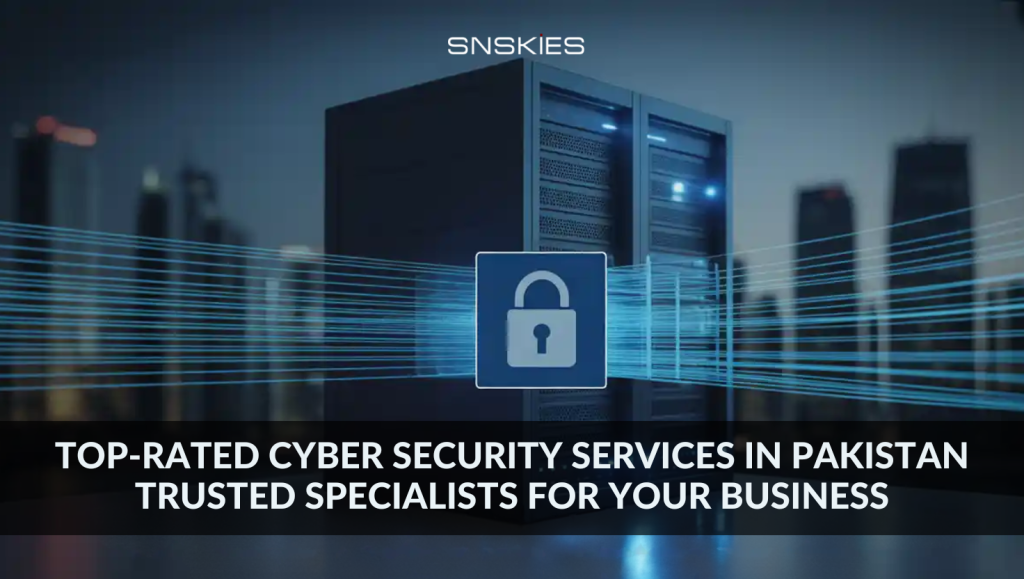
Articles Ultimate Guide to SOCaaS Providers in 2025: Why SNSKIES is Transforming Global Cybersecurity Articles Ultimate Guide to SOCaaS Providers in 2025: Why SNSKIES is Transforming Global Cybersecurity Articles July 23, 2025 Introduction to SNSKIES and the Importance of Cyber Security In today’s digital-first world, data is more valuable than gold. For businesses in Pakistan, the threat landscape is evolving faster than ever before. From ransomware to phishing attacks, cybercriminals are becoming more sophisticated. This is where SNSKIES, a top-rated provider of Cyber Security Services in Pakistan, steps in. With a team of certified experts and a robust approach to modern cybersecurity, SNSKIES empowers businesses to stay protected, compliant, and resilient. Cyber security is no longer optional—it’s a critical business function. Especially for sectors like finance, healthcare, e-commerce, and education, where even a minor breach can lead to devastating consequences. SNSKIES understands this and offers end-to-end protection tailored for every business size. Why Choose SNSKIES for Cyber Security Services in Pakistan? Proven Experience Across Industries SNSKIES has built its reputation by protecting digital assets across diverse sectors. Whether it’s a fintech startup or a government agency, their solutions adapt to different risk profiles, ensuring custom-fit protection. Tailored Security Strategies SNSKIES doesn’t believe in one-size-fits-all solutions. They assess your infrastructure, identify weak points, and build customized security layers that grow with your business. Cutting-Edge Tools and Global Standards SNSKIES uses top-tier technologies that align with global standards like ISO/IEC 27001 and NIST. They implement firewalls, intrusion detection systems, and behavior analytics that stop threats before they cause damage. Key Cyber Security Services Offered by SNSKIES Network Security Management They secure your internal and external network boundaries through intrusion prevention systems (IPS), DDoS mitigation, and advanced firewall configurations. Endpoint Detection & Response (EDR) SNSKIES deploys EDR solutions to monitor endpoints continuously, detect suspicious activity, and respond to threats in real time. Cloud Security Solutions As businesses shift to the cloud, SNSKIES ensures their SaaS, PaaS, and IaaS infrastructures are safe from misconfigurations, leaks, and insider threats. Threat Intelligence and Risk Assessment They offer real-time threat intelligence feeds and conduct comprehensive risk assessments to identify vulnerabilities proactively. Managed Security Services (MSSP) SNSKIES acts as your outsourced security team. Their MSSP model provides 24/7 monitoring, incident handling, and security reporting at a fraction of in-house costs. SNSKIES’ Role in Protecting Businesses in Pakistan Securing SMEs and Enterprises From startups to enterprise networks, SNSKIES implements scalable security protocols that suit budget constraints without compromising effectiveness. Protecting E-commerce and Financial Sectors Online transactions and digital wallets are prime targets. SNSKIES helps fintech companies implement secure payment gateways and encryption layers to protect user data. Cyber Hygiene for Educational Institutions Schools and universities often lack the technical expertise to handle cyber threats. SNSKIES provides training, firewall management, and safe internet policies to secure student and faculty data. Role of a Cyber Security Specialist at SNSKIES Certified Expertise and Continuous Learning Every cyber security specialist at SNSKIES holds globally recognized certifications like CEH, CISSP, and CISM. They also stay updated with new vulnerabilities and countermeasures. Incident Response and Recovery Capabilities In the event of a breach, SNSKIES provides immediate containment, forensic analysis, and recovery planning to minimize downtime. Security Audits and Compliance Guidance SNSKIES conducts regular audits to keep your business aligned with compliance regulations like GDPR, PCI-DSS, and local laws. Industry Sectors Covered by SNSKIES Healthcare SNSKIES implements HIPAA-aligned controls to secure patient records and hospital databases from cyberattacks. Fintech and Banking They provide advanced fraud detection, transaction monitoring, and identity verification solutions for financial institutions. Manufacturing and Industrial IoT security is key in industrial setups. SNSKIES offers protection for industrial control systems (ICS) and SCADA networks. Government and Public Sector SNSKIES assists public offices in securing citizen data, electoral systems, and public portals from both internal and external threats. Emerging Threats and How SNSKIES Stays Ahead Zero-Day Vulnerability Response SNSKIES is quick to patch and deploy defenses against zero-day exploits using threat-sharing platforms and real-time intelligence. AI-Powered Monitoring Tools Their AI systems predict attack vectors based on behavior anomalies, minimizing manual oversight and improving response times. Continuous Threat Hunting SNSKIES employs threat hunters to proactively search for hidden malware or breaches within your network, offering advanced protection beyond automation. Compliance and Regulatory Adherence by SNSKIES ISO/IEC 27001 Standards SNSKIES ensures your organization adheres to international standards in information security management. GDPR and Local Data Protection Laws They help businesses in Pakistan handle personal data responsibly and lawfully to avoid legal penalties. Cyber Security Frameworks (NIST, CIS) SNSKIES integrates globally recognized frameworks to help you meet both national and international cybersecurity benchmarks. Client Success Stories and Impact Metrics Before and After Security Improvements Clients have reported a 75% decrease in attempted breaches after implementing SNSKIES services. ROI of Implementing SNSKIES Solutions For every $1 invested in SNSKIES’ security infrastructure, clients save up to $10 in potential breach-related costs, including legal fees and reputation damage. How to Engage SNSKIES for Cyber Security Services Initial Consultation Process SNSKIES offers a free initial security consultation, identifying potential vulnerabilities before drafting a solution roadmap. Customized Proposal and Pricing They provide transparent, scalable pricing models based on your organization’s specific needs and industry. Onboarding and 24/7 Support Once engaged, SNSKIES becomes a part of your team, offering round-the-clock monitoring, regular updates, and fast-track support. Conclusion – Why SNSKIES is the Future of Cyber Security in Pakistan In a time where digital threats loom large, choosing a proactive and expert cybersecurity partner is not just wise—it’s essential. SNSKIES isn’t just another service provider; they are a team of visionary cyber security specialists dedicated to protecting businesses in Pakistan and beyond. With their advanced tools, customized strategies, and unwavering commitment to compliance, SNSKIES is redefining how cybersecurity should be delivered in today’s threat-laden landscape. FAQs About Cyber Security Services Why are cyber security services important for Pakistani businesses? With increasing digitalization, Pakistani businesses face more cyber threats than ever. Services like those offered by SNSKIES help prevent data breaches, fraud, and compliance violations.
Top SOC Vendors as a Service Providers for Businesses (2025 Guide)

Articles Top SOC Vendors as a Service Providers for Businesses (2025 Guide) Articles Top SOC Vendors as a Service Providers for Businesses (2025 Guide) Articles July 29, 2025 In the ever-evolving landscape of digital threats, SOC vendors have become the backbone of cyber resilience for modern businesses. As the need for 24/7 cybersecurity grows, more organizations are turning to SOCaaS (Security Operations Center as a Service) solutions. And among the rising stars in this field is SNSKIES, delivering globally trusted, scalable security solutions. What Is a SOC and Why It Matters in Today’s Digital World? A Security Operations Center (SOC) is the brain behind your company’s cybersecurity strategy. It’s where cybersecurity experts work around the clock to detect, monitor, and respond to threats before they cause damage. Whether you’re running an eCommerce store, a fintech app, or managing critical infrastructure—having a SOC means you’re not leaving your digital doors unlocked. The Rise of SOC Vendors and SOCaaS Globally Gone are the days when companies had to invest millions to build an in-house SOC. Thanks to SOCaaS, even startups and mid-sized businesses now have access to top-tier cybersecurity. These managed SOC vendors operate remotely, leveraging cloud infrastructure to deliver real-time threat detection and mitigation at a fraction of the cost. The Role of SOC in Cybersecurity Strategy Security is no longer optional—it’s fundamental. SOC cyber security integrates proactive monitoring, incident response, and intelligence gathering into a seamless operation. It safeguards: Personal and financial data Intellectual property Business continuity Regulatory compliance SOC teams act as both watchdogs and responders, staying ahead of cybercriminals. Key Components of a Modern Security Operations Center (SOC) To truly understand what makes a SOC vendor effective, you need to know the core elements of a modern SOC setup. Core Functions of a SOC Team Monitoring & Detection: Real-time threat analysis. Incident Response: Rapid countermeasures. Investigation: Root cause analysis. Threat Intelligence: Stay informed on the latest threats. Reporting & Compliance: Ensure industry-standard practices. Essential Tools Used in SOCaaS Offerings SIEM (Security Information & Event Management) XDR (Extended Detection & Response) SOAR (Security Orchestration, Automation, and Response) Endpoint Detection and Response (EDR) Compliance Standards SOC Vendors Must Meet Reputable SOC providers follow frameworks like: SOC 2 (Trust Service Principles) ISO/IEC 27001 GDPR & CCPA compliance What Makes a Top SOC Vendor in 2025? Not all SOC vendors are created equal. A top-tier provider must demonstrate: 1. Vendor Transparency and Trustworthiness Clear policies, third-party audits, and real-time reporting define a trustworthy vendor. 2. Scalability and Global Monitoring Capabilities Your SOC partner should grow with you. That means global data centers, multilingual support, and 24/7 incident handling. 3. Multi-Tenant Cloud Architecture & Cost Efficiency Top vendors like SNSKIES use multi-tenant SaaS platforms, ensuring lower costs and easier maintenance for clients. SNSKIES – An Emerging Force Among Global SOC Vendors SNSKIES is making waves globally, combining innovation, compliance, and AI-powered threat detection into a singular, robust SOCaaS offering. Unique Offerings by SNSKIES in SOC Cyber Security AI-driven threat analytics Cloud-native SIEM integration Real-time incident escalation workflows Compliance-ready reports for all industries Why Businesses Worldwide Trust SNSKIES? With operations across continents, SNSKIES provides localized security expertise with a global reach. Businesses choose them for: Their 99.99% threat response SLA Military-grade encryption protocols Scalable solutions for startups to enterprises Choosing the Right SOC Vendor for Your Business Needs What Can a Managed SOC Protect? From public clouds and hybrid infrastructures to internal servers and third-party SaaS tools—a SOC vendor protects everything. What Is SOCaaS? (Security Operations Center as a Service) A subscription-based model that lets businesses outsource their entire security operations to professionals like SNSKIES. SOC 2 Vendor Management: Ensuring Vendor Compliance Vendor security isn’t just about your data—it’s also about who your vendors trust. SOC 2 compliance ensures third-party security vendors maintain strict privacy and integrity protocols. Conclusion: Future of SOC Vendors and the Role of SNSKIES As cyber threats grow in scale and complexity, the importance of SOC vendors will only increase. Whether you’re a startup or a global enterprise, choosing the right SOC partner is critical. Providers like SNSKIES are setting new standards in SOC cyber security, offering real-time protection, AI-driven monitoring, and global compliance—all with unmatched affordability. Articles July 29, 2025 In the ever-evolving landscape of digital threats, SOC vendors have become the backbone of cyber resilience for modern businesses. As the need for 24/7 cybersecurity grows, more organizations are turning to SOCaaS (Security Operations Center as a Service) solutions. And among the rising stars in this field is SNSKIES, delivering globally trusted, scalable security solutions. What Is a SOC and Why It Matters in Today’s Digital World? A Security Operations Center (SOC) is the brain behind your company’s cybersecurity strategy. It’s where cybersecurity experts work around the clock to detect, monitor, and respond to threats before they cause damage. Whether you’re running an eCommerce store, a fintech app, or managing critical infrastructure—having a SOC means you’re not leaving your digital doors unlocked. The Rise of SOC Vendors and SOCaaS Globally Gone are the days when companies had to invest millions to build an in-house SOC. Thanks to SOCaaS, even startups and mid-sized businesses now have access to top-tier cybersecurity. These managed SOC vendors operate remotely, leveraging cloud infrastructure to deliver real-time threat detection and mitigation at a fraction of the cost. The Role of SOC in Cybersecurity Strategy Security is no longer optional—it’s fundamental. SOC cyber security integrates proactive monitoring, incident response, and intelligence gathering into a seamless operation. It safeguards: Personal and financial data Intellectual property Business continuity Regulatory compliance SOC teams act as both watchdogs and responders, staying ahead of cybercriminals. Key Components of a Modern Security Operations Center (SOC) To truly understand what makes a SOC vendor effective, you need to know the core elements of a modern SOC setup. Core Functions of a SOC Team Monitoring & Detection: Real-time threat analysis. Incident Response: Rapid countermeasures. Investigation: Root cause analysis. Threat Intelligence: Stay informed on the latest threats. Reporting & Compliance: Ensure industry-standard practices.
Ultimate Guide to SOCaaS Providers in 2025: Why SNSKIES is Transforming Global Cybersecurity

Articles Ultimate Guide to SOCaaS Providers in 2025: Why SNSKIES is Transforming Global Cybersecurity Articles Ultimate Guide to SOCaaS Providers in 2025: Why SNSKIES is Transforming Global Cybersecurity Articles July 23, 2025 Introduction to SOCaaS and the Role of SNSKIES What is SOC as a Service (SOCaaS)? SOCaaS Providers, or Security Operations Center as a Service, is a cloud-based cybersecurity offering that delivers 24/7 threat detection, response, and analysis for businesses. It eliminates the need for expensive on-site infrastructure, instead offering outsourced monitoring through top-tier experts and technologies. Why Businesses Are Turning to SOCaaS As cyber threats grow in volume and sophistication, especially with cloud-first ecosystems, traditional security models can’t keep up. Small and medium-sized businesses, often operating on limited budgets, find it challenging to build an internal SOC. SOCaaS solves this problem by offering an always-on, scalable, and cost-effective security layer. SNSKIES: Pioneering a New Era of Managed Cybersecurity SNSKIES is at the forefront of this transformation. By delivering intelligent SOCaaS solutions, SNSKIES empowers organizations worldwide to protect digital assets without the overhead of managing complex security systems. Its architecture is designed for global scalability, AI-enhanced threat response, and seamless integration for MSSPs. Core Components of SOCaaS Providers Dedicated SOC Teams and Expert Staff A top-tier SOCaaS provider like SNSKIES maintains a round-the-clock team of analysts, engineers, and compliance officers who specialize in threat detection, forensic analysis, and crisis containment. This talent pool is often the backbone of its proactive defense strategy. Advanced Toolsets: EDR, SIEM, Forensics SNSKIES deploys an integrated suite of tools, including Endpoint Detection and Response (EDR), Security Information and Event Management (SIEM), and advanced forensics. These tools correlate signals across networks, identify anomalies, and deliver actionable alerts instantly. Standardized Security Processes & SLA Models With well-defined roles and clear Service Level Agreements (SLAs), SNSKIES ensures consistent, measurable performance. Each client engagement comes with tailored incident response procedures, defined escalation paths, and full regulatory compliance. How SNSKIES Elevates SOCaaS for MSSP Providers Custom Solutions for MSSPs and MSPs SNSKIES designs its platform to enhance the value proposition for MSSP providers, offering multi-tenant support, white-label options, and flexible deployment models. Cyber Threat Intelligence Integration Threat intelligence is central to SNSKIES’ offering. Its global sensor network and AI-powered engines deliver up-to-date threat feeds, allowing MSSPs to stay ahead of attack trends. Seamless Client Portals and Reporting Dashboards Clients receive real-time insights via customizable dashboards, featuring metrics like Mean Time to Detect (MTTD) and Mean Time to Respond (MTTR). These visuals help MSSPs prove ROI to clients and ensure full transparency. Global Business Sectors Benefiting from SOCaaS Finance, Healthcare, and Retail These industries are frequent cyberattack targets due to sensitive data and high transaction volumes. SOCaaS solutions like SNSKIES ensure compliance with standards such as HIPAA, PCI DSS, and GDPR. Government and Education Public institutions often lag in adopting advanced security. SOCaaS provides them with cutting-edge threat detection and protection without straining budgets. SMEs and Enterprise-Scale Operations Whether you’re a growing startup or a global enterprise, SOCaaS adapts to your threat landscape. SNSKIES ensures scalability, speed, and agility at every phase. Why SOCaaS is Essential for Modern Enterprises Continuous Monitoring & Rapid Response In the world of cyber defense, timing is everything. SNSKIES delivers real-time monitoring and automated responses to cut detection-to-resolution time drastically. AI-Powered Analytics for Threat Detection SNSKIES uses machine learning algorithms to detect unusual behaviors and predict potential breaches, providing clients with future-proof security. Compliance & Risk Management Enhancements Through detailed reporting and built-in compliance checks, SNSKIES helps organizations meet global standards like ISO 27001, NIST, and CIS. Key Benefits of SOCaaS Providers like SNSKIES 24/7 Cybersecurity Coverage Lower Total Cost of Ownership Fast Deployment with Minimal Configuration AI-Driven Risk Prioritization Proactive Threat Hunting FAQs About SOCaas providers How is SOCaaS from SNSKIES different from traditional security services? SNSKIES provides a modern, cloud-native SOCaaS platform focused on real-time threat detection, AI-powered analytics, and automated incident response. Unlike traditional services that may rely heavily on manual processes, SNSKIES combines advanced machine learning with human intelligence to deliver proactive, accurate, and scalable security operations. Can SNSKIES integrate with my current cybersecurity tools and IT environment? Yes. SNSKIES is built for seamless integration with existing IT and security tools, including firewalls, EDR, SIEM platforms, and cloud infrastructure. This ensures complete visibility and centralized control without the need to replace your current stack. What does the SNSKIES onboarding process include? SNSKIES offers a rapid onboarding experience. Within days, your organization is connected to the platform, logs are centralized, detection rules are customized, and real-time monitoring begins. The onboarding team provides step-by-step guidance to ensure smooth deployment without disruption. How does SNSKIES support compliance with industry regulations? SNSKIES delivers compliance-ready reporting and dashboards for frameworks like GDPR, HIPAA, ISO 27001, and PCI DSS. Its continuous monitoring and automated documentation ensure that organizations remain audit-ready and aligned with regulatory mandates. What makes SNSKIES effective at reducing false positives? SNSKIES uses context-aware detection engines and behavioral analytics to filter out noise and false alerts. Combined with human threat analysts, this approach ensures that only credible, high-priority threats are escalated—drastically reducing alert fatigue.
Top SOC as a Service Providers – Boosting Global Cybersecurity with SNSKIES
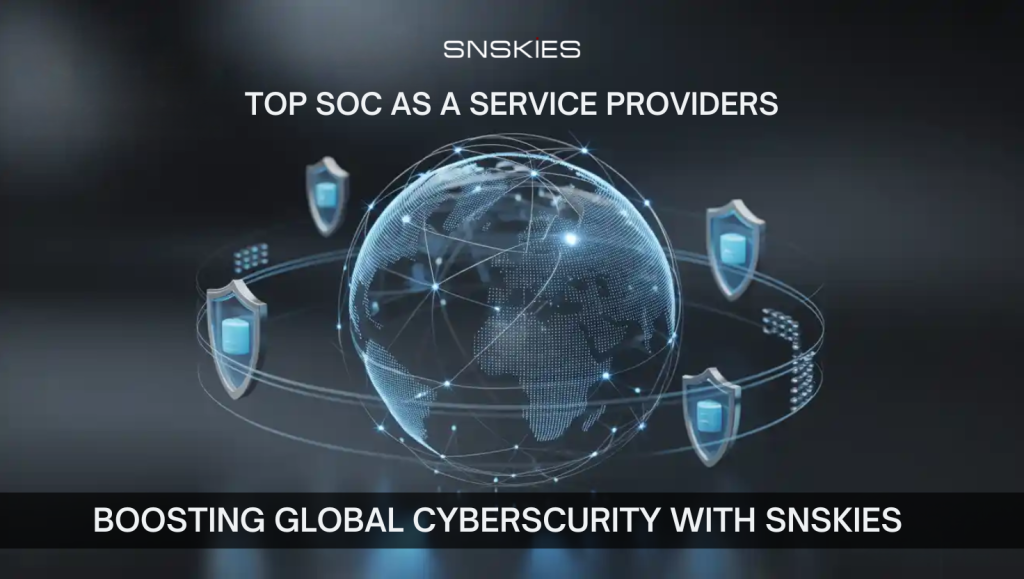
Articles Top SOC as a Service Providers – Boosting Global Cybersecurity with SNSKIES Articles Top SOC as a Service Providers – Boosting Global Cybersecurity with SNSKIES Articles July 21, 2025 In today’s cyber‑threat landscape, businesses worldwide need more than just reactive measures. Top SOC as a Service providers deliver robust, continuous protection—monitoring, detecting, and responding to threats just when time matters most.While internal teams are valuable, they may lack around‐the‐clock coverage or advanced expertise. Outsourcing to SOC as a Service companies like SNSKIES guarantees 24/7 vigilance, experienced analysts, and scalable, all‑inclusive pricing—perfectly aligning with cutting‑edge security demands. Why Choose SOC as a Service Providers Modern cybersecurity must be proactive and comprehensive. A Security Operations Center (SOC) not only monitors logs and alerts but actively hunts threats, assesses risk, and blocks breaches. Yet, most companies find their internal SOCs overstretched. Combining in‑house experts with external managed SOC providers addresses this gap: you get global threat intelligence and specialized skills without all the overhead of building a larger internal team. Primary Criteria to Identify Top SOC as a Service Providers To identify the best SOC as a Service companies, use key metrics: Team size & technical capacity: Over 250 dedicated experts ensure speed and variety in skillsets. Global market tenure: A decade-plus presence reflects maturity and adaptability. Team Qualifications and Expertise Top providers invest in credentials. A qualified team balances hard certifications with soft skills—communication, empathy, and a people‑first approach. When security analysts speak your language and mindset, response improves, trust builds, and outcomes get better. Global Experience and Industry Recognition Providers with 15+ years of international experience have encountered diverse cyber‑attack patterns and regulatory environments. You want a partner with proven success across borders—indicated by solid Clutch and G2 feedback. Key Features Offered by Managed SOC Providers Outstanding SOC as a Service offerings typically include: Continuous & proactive threat monitoring using real-time feeds On-demand threat assessment and remediation guidance 24/7 concierge-style support teams ready for critical incidents Containment mechanisms to isolate threats before they spread This feature suite ensures your digital assets and reputation stay protected round‑the‑clock. Pros & Cons of Leading SOC as a Service Companies Based on analyst reviews, you can expect: Pros: Actionable alerts—not noise Better visibility and threat detection Clear, periodic reporting Cons: Some configuration limitations Limited forensic resources for deep responses Integration complexity with certain tech stacks Higher upfront cost compared to basic offerings What Differentiates the Best SOC as a Service Providers When choosing among top SOC as a service providers, focus on two dimensions: Elite Technical Teams Secure your systems with experts—ISO certifications, 18+ years of experience, and advanced toolset mastery. “Can‑Do” Culture and People‑First Mindset Hard skills matter, but people matter more. Partners that prioritize empathy, communication, and collaboration consistently deliver a better client experience. The Importance of U.S.-Based Support For U.S. companies, U.S.-based teams eliminate timezone friction and ensure real-time responsiveness. SNSKIES delivers seamless English-language support aligned with your working hours. Predictable Monthly Pricing Models Transparent, flat-rate pricing is a key differentiator. With providers like SNSKIES, you pay one monthly fee whatever your usage—even during incident spikes. No surprises. No overages. How SNSKIES Excels Among SOC as a Service Providers SNSKIES emerges as a top SOC as a Service provider by: SNSKIES is driven by an elite force of certified professionals, bringing more than three hundred security experts and decades of combined insight Global 24/7 support: Covering multiple time zones with real-time response All-inclusive pricing: One flat monthly rate, unlimited coverage Proactive strategy: From threat hunting to containment, SNSKIES operates ahead of the curve How to Choose the Best SOC as a Service Provider Here’s your evaluation checklist: Team size & certificate count—bigger teams = broader coverage Real-time monitoring & remediation tools—look for automation & orchestration Transparent pricing—avoid hidden fees 24/7 support—preferably aligned to your timezone Conclusion To protect against evolving cyber threats, businesses need the best SOC as a Service providers—equipped with skilled teams, proactive monitoring, U.S.-based support, and predictable pricing. SNSKIES offers precisely this combination, positioning itself as an outstanding choice for companies seeking robust, relatable, and scalable SOC coverage. FAQs About SOC as a Service What is SOC as a Service? SOC as a Service is a managed security model where external experts monitor, detect, and respond to cyber threats on your behalf, 24/7. Why outsource SOC operations? Outsourcing gives you access to global expertise, scalability, and continuous protection—without hiring and training a full internal team. How is pricing structured? Top providers offer simple monthly flat-rate pricing, avoiding complex per-device or per-user charges for easier budgeting. Do all providers offer U.S.-based support? No—but the best ones do. U.S.-based teams offer superior communication alignment and faster response times. How do I evaluate SOC certifications? Look for industry-standard credentials like CISSP, CEH, and GIAC. Also examine collective experience. Recent Post All Posts Articles Top SOC as a Service Providers – Boosting Global Cybersecurity with SNSKIES July 21, 2025/ Fully Managed SOC as a Service – Smart Cybersecurity for U.S. Businesses by SNSKIES July 16, 2025/ Managed SOC as a Service (SOCaaS) – Why Businesses Trust SNSKIES for 24/7 Threat Monitoring July 10, 2025/ Older Posts
Fully Managed SOC as a Service – Smart Cybersecurity for U.S. Businesses by SNSKIES
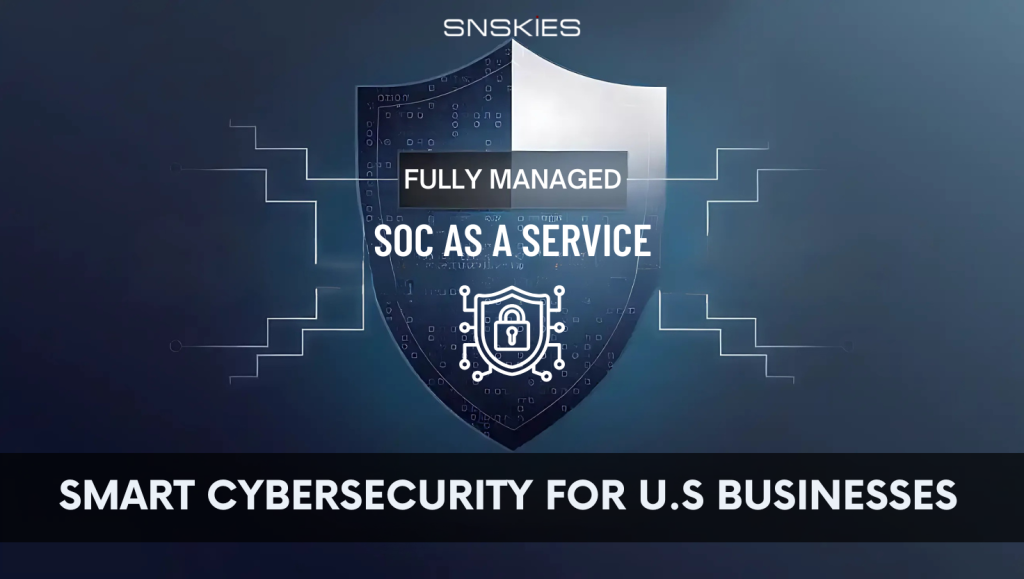
Articles Fully Managed SOC as a Service – Smart Cybersecurity for U.S. Businesses by SNSKIES Articles Fully Managed SOC as a Service – Smart Cybersecurity for U.S. Businesses by SNSKIES Articles July 16, 2025 Cyberattacks are no longer a possibility—they’re a daily reality for U.S. businesses. From ransomware crippling hospitals to data breaches hitting finance and tech firms, the stakes are higher than ever. The real question is: Can your business detect and respond to threats before damage is done? That’s where SNSKIES steps in with our Fully Managed SOC (Security Operations Center)—a U.S.-ready, enterprise-grade solution that delivers continuous threat monitoring, intelligent detection, and rapid incident response, all without the cost and complexity of building your own SOC. Why U.S. Businesses Need a Fully Managed SOC Across the United States, small to mid-sized companies face three key cybersecurity challenges: Lack of 24/7 in-house security staff Inability to detect advanced threats like fileless malware and insider attacks Ever-changing compliance pressures (HIPAA, PCI-DSS, SOX, etc.) A fully managed SOC as a Service solves these problems by giving you real-time security operations delivered by experts, backed by enterprise-grade analytics and automation—without stretching your internal team or budget. SNSKIES SOC as a Service: Built for U.S. Business Needs SNSKIES provides a U.S.-centric cybersecurity approach designed for performance, speed, and compliance. 1. 24/7 Threat Detection & Response Our SOC analysts monitor your environment round-the-clock to identify and neutralize threats before they impact your operations. 2. U.S.-Aligned Compliance Support From financial services to healthcare, we provide the necessary monitoring, reporting, and alerts to help meet U.S. compliance frameworks like HIPAA, NIST, and ISO 27001. 3. Scalable, Cost-Controlled Security Whether you’re a 50-person startup or a 1,000-employee SaaS company, our SOC grows with your business while keeping costs predictable. 4. Seamless Integration with Your IT Environment No rip-and-replace. SNSKIES integrates with your existing infrastructure (cloud, on-prem, or hybrid) to enable fast deployment with minimal friction. What’s Included in SNSKIES Fully Managed SOC Our comprehensive SOC as a Service offering includes: Phishing Detection & Response (Phishing SOC) Dark Web Monitoring for Stolen Data Domain Monitoring for Unauthorized Activity Behavioral Analytics for Insider Threats Advanced Log Management & Correlation Managed Vulnerability Scanning Phishing Simulation & Security Training Network Detection & Response (NDR) Perfect for These Types of U.S. Businesses SNSKIES SOC is designed for U.S. organizations that: Operate in regulated sectors (Healthcare, Finance, Legal, SaaS) Lack the budget or headcount to build a 24/7 in-house SOC Are experiencing fast growth and need scalable cybersecurity Have been targeted by ransomware or phishing in the past Are undergoing a digital transformation or cloud migration Whether you’re based in New York, Los Angeles, Chicago, Austin, or Miami, we provide nationwide coverage with security expertise tailored to your risk profile. Fully Managed vs. In-House SOC: What U.S. Companies Should Know Feature Fully Managed SOC (SNSKIES) In-House SOC Initial Setup Time 2–4 Weeks 6–12 Months Cost Low monthly rate High CAPEX + OPEX Staffing 24/7 experts included Must hire & retain analysts Scalability Instantly scalable Limited to resources U.S. Compliance Support Included Custom setup needed Most U.S. companies—especially those with growing digital operations—find that outsourcing to a fully managed SOC is more effective, faster to implement, and easier to scale. Co-Managed SOC Option for Hybrid Teams Already have an internal security or IT team? SNSKIES offers co-managed SOC options that give your team access to our platform, tools, dashboards, and live threat data—without losing control. It’s a collaborative, transparent approach that blends your team’s knowledge with our 24/7 global coverage and cybersecurity expertise. FAQs What size of U.S. business benefits from SOC as a Service? Businesses from 50 to 5,000 employees benefit, especially those with sensitive data or compliance requirements. Is a fully managed SOC better than hiring a security team? For most SMBs and mid-size companies in the U.S., a managed SOC provides better coverage, faster detection, and lower cost than building a team from scratch. How fast can we go live? SNSKIES can have your business protected in as little as 2–4 weeks. Will this help with HIPAA, NIST, or ISO 27001 compliance? Will this help with HIPAA, NIST, or ISO 27001 compliance? What if we already have security tools in place? We integrate with your existing stack to enhance visibility and improve response, not replace what already works. Recent Post All Posts Articles Fully Managed SOC as a Service – Smart Cybersecurity for U.S. Businesses by SNSKIES July 16, 2025/ Managed SOC as a Service (SOCaaS) – Why Businesses Trust SNSKIES for 24/7 Threat Monitoring July 10, 2025/ What Are SD WAN Managed Service Providers? | Benefits, Working, and Why SNSKIES is the Right Choice July 7, 2025/ Older Posts
Managed SOC as a Service (SOCaaS) – Why Businesses Trust SNSKIES for 24/7 Threat Monitoring
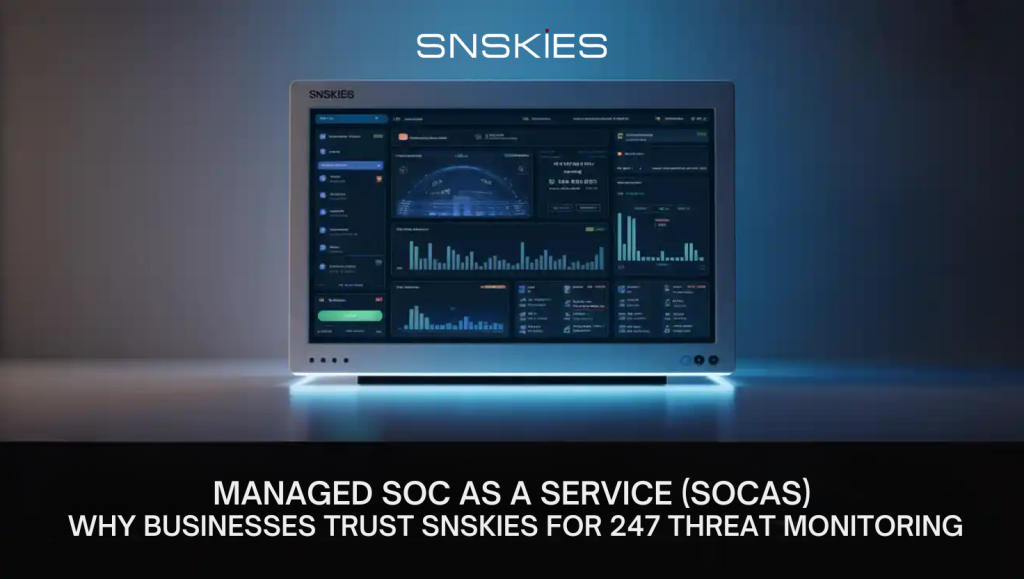
Articles SNSKIES Incident Detection & Response | ISO-Certified Cybersecurity Experts Articles SNSKIES Incident Detection & Response | ISO-Certified Cybersecurity Experts Articles July 1, 2025 In today’s hyper-connected digital environment, cyber threats are no longer a question of “if” but “when.” For businesses aiming to stay ahead of attackers, a traditional in-house Security Operations Center (SOC) may no longer be the most practical or cost-effective solution. That’s where Managed SOC as a Service (SOCaaS) steps in—and SNSKIES is leading the way. What is Managed SOC as a Service (SOCaaS)? SOCaaS is a subscription-based security solution where a third-party provider like SNSKIES delivers end-to-end SOC capabilities, including log monitoring, threat detection, incident response, and compliance oversight. Think of it as an outsourced security command center, but tailored to your business, available 24/7, and powered by cybersecurity experts and cutting-edge technology. Rather than investing in costly infrastructure, staff, and tools, businesses can now rely on SNSKIES’ managed SOC services to provide enterprise-grade protection on demand. Why Choose SNSKIES for SOC as a Service? 24/7 Cyber Threat Protection Cyber attacks don’t follow business hours, and neither do we. SNSKIES’ SOC experts work around the clock, continuously monitoring your networks, cloud environments, endpoints, and logs to identify and neutralize threats before they cause harm. Faster Threat Detection and Response Speed matters. With a layered approach combining automated tools and experienced analysts, SNSKIES enables real-time alerting, fast investigation, and swift remediation—reducing dwell time and minimizing risk. Scalable and Flexible Solutions Whether you’re a startup or a growing enterprise, our SOCaaS platform grows with your needs. Scale services up or down based on your security posture, seasonal demand, or compliance requirements. Cost-Efficient Security Expertise Building an in-house SOC can be overwhelming and expensive. With SNSKIES, you get access to a fully operational SOC and a team of skilled cybersecurity professionals—without the overhead. Cloud-Native by Design From hybrid networks to serverless environments, SNSKIES is engineered for modern IT. Our managed SOC services are optimized for seamless integration across cloud, on-premises, and containerized deployments. Core Features of SNSKIES’ Managed SOC Services Real-time log and network monitoring Extended detection and response (XDR) Threat intelligence and behavior analytics Incident triage, investigation & remediation Vulnerability and patch management Compliance tracking and reporting (ISO 27001, GDPR, etc.) Integration with your existing security stack How SOCaaS Helps You Stay Secure Minimizes breach risk through continuous monitoring and threat intelligence Eliminates alert fatigue by prioritizing actionable incidents Frees internal teams to focus on core IT initiatives Improves compliance by automating evidence collection and audits Bridges skill gaps with on-demand access to expert threat hunters and analysts Who Should Use Managed SOC Services? SOCaaS is ideal for: Businesses without a dedicated security team Companies scaling rapidly or expanding into cloud environments Organizations managing sensitive data or regulatory compliance Enterprises seeking cost-effective alternatives to on-premise SOC Choosing the Right SOCaaS Provider A strong SOCaaS partner should offer more than just technology—they must deliver trust, transparency, and measurable outcomes. SNSKIES brings together advanced tools, top-tier talent, and deep threat intelligence to deliver cybersecurity that evolves with your business. What Threats Does SOCaaS Monitor? SNSKIES’ Managed SOC as a service solution provider monitors and responds to: Ransomware Phishing and credential theft Insider threats DDoS attacks Cloud misconfigurations Lateral movement within networks Zero-day vulnerabilities Final Thoughts Cybersecurity can no longer be reactive or optional. As threats become more advanced, companies must rethink their security strategies. With SNSKIES’ Managed SOC as a Service, you get enterprise-grade defense that’s proactive, affordable, and scalable. Your business deserves more than basic protection. It deserves a fully managed, always-on security operation—powered by SNSKIES. FAQs Is SOCaaS suitable for small businesses? Yes. SOCaaS by SNSKIES is highly scalable, making it a perfect fit for small businesses seeking enterprise-level protection without building a full SOC. How fast is the onboarding process? Our onboarding is quick and efficient. Most organizations are fully operational within days, not weeks. Can SNSKIES integrate with existing security tools? Absolutely. SNSKIES supports seamless integration with your SIEM, EDR, firewalls, and other security infrastructure. Is data confidentiality maintained with SOCaaS? Yes. SNSKIES follows strict data privacy policies and aligns with international standards like ISO 27001 and GDPR. hat makes SNSKIES different from other SOCaaS providers? Unlike generic providers, SNSKIES offers personalized service, human-led investigation, and deep threat intelligence with a focus on proactive defense. Recent Post All Posts Articles Managed SOC as a Service (SOCaaS) – Why Businesses Trust SNSKIES for 24/7 Threat Monitoring July 10, 2025/ What Are SD WAN Managed Service Providers? | Benefits, Working, and Why SNSKIES is the Right Choice July 7, 2025/ SNSKIES Incident Detection & Response | ISO-Certified Cybersecurity Experts July 1, 2025/ Older Posts
What Are SD WAN Managed Service Providers? | Benefits, Working, and Why SNSKIES is the Right Choice
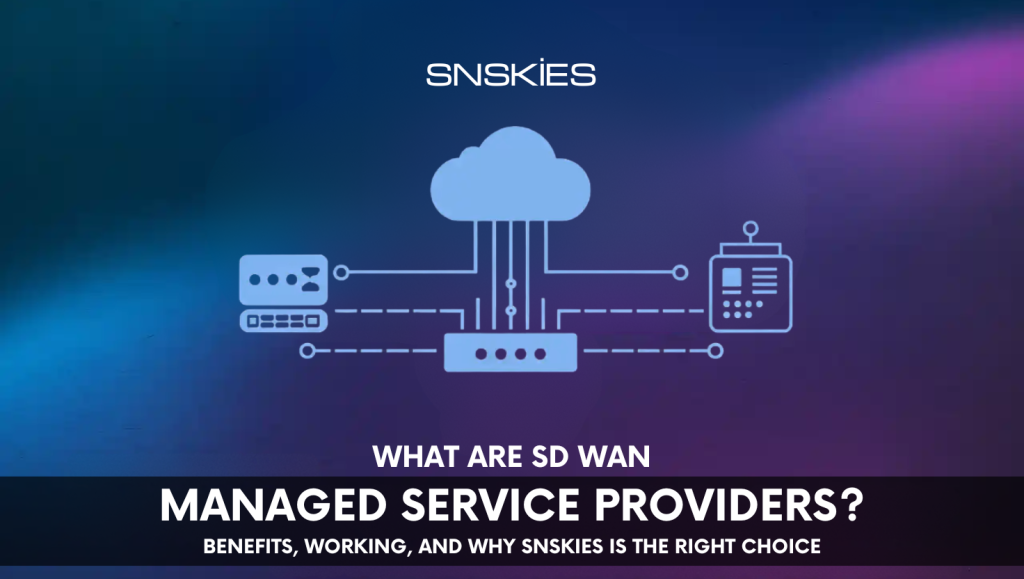
Articles What Are SD WAN Managed Service Providers? | Benefits, Working, and Why SNSKIES is the Right Choice Articles What Are SD WAN Managed Service Providers? | Benefits, Working, and Why SNSKIES is the Right Choice Articles July 7, 2025 In today’s cloud-first, high-performance business environment, SD-WAN is no longer a luxury—it’s a necessity. As one of the leading SD WAN managed service providers, SNSKIES helps organizations modernize their network infrastructure with secure, scalable, and intelligent solutions that simplify WAN management and elevate user experiences. What Is a Managed SD-WAN Service? A managed SD-WAN is a fully outsourced solution where a service provider like SNSKIES oversees the deployment, configuration, monitoring, and optimization of your software-defined wide area network (SD-WAN). This approach allows businesses to reduce IT complexity, improve network visibility, and ensure high performance across multi-site operations. With SNSKIES as your trusted SD WAN managed service provider, your IT team is free to focus on strategic initiatives while we handle the operational intricacies of your WAN infrastructure. Why Businesses Choose SD-WAN Managed Service Providers Like SNSKIES 1. Scalability & Flexibility As businesses expand, so do their networking needs. SNSKIES provides scalable SD-WAN solutions that grow with your organization. Whether you operate five sites or fifty, our multi-tenant architecture ensures a seamless experience. 2. Centralized Visibility & Control Gain real-time insights and control over your network with centralized dashboards. SNSKIES provides intuitive management tools that enable faster decision-making and better resource allocation. 3. Performance-Driven Architecture Our SD-WAN platform intelligently identifies applications and routes traffic based on SLA requirements, ensuring low latency, high bandwidth, and unmatched application performance. 4. Cost Efficiency Traditional MPLS solutions are expensive and inflexible. Our managed SD-WAN services lower operational costs without compromising security or performance. How SNSKIES Managed SD-WAN Works At SNSKIES, we provide an end-to-end software-defined networking solution. Here’s how our process works: Consultation & Network Assessment We begin by understanding your existing network architecture and identifying performance gaps. Design & Deployment A tailored SD-WAN solution is deployed, integrating seamlessly with your current systems. Ongoing Monitoring & Support Our 24/7 NOC team monitors your infrastructure for uptime, SLA adherence, and real-time troubleshooting. Lifecycle Management From firmware updates to policy management, SNSKIES takes full responsibility for the health of your WAN. Benefits of Choosing SNSKIES as Your SD WAN Managed Service Provider Secure and encrypted connections Reduced network downtime Cloud-native architecture Custom routing policies for critical applications Support for hybrid and multi-cloud environments Edge-to-cloud visibility Pros and Cons of Managed SD-WAN Pros Simplified management Cost-effective Improved agility Enhanced security Better user experience 2. Cons Initial dependency on provider Requires proper integration planning However, with SNSKIES, these challenges are mitigated through transparent processes, expert onboarding, and continuous technical support. Ready to Redefine Your Network? Traditional networks struggle to meet the demands of remote workforces and cloud-native operations. It’s time to make your WAN work smarter, not harder. SNSKIES, a leading sd-wan managed service provider, delivers the reliability, security, and scalability your business needs—today and into the future. Final Thoughts The demand for SD-WAN managed service providers is rapidly increasing—and for good reason. As IT environments grow more complex, businesses need reliable partners to handle their networking needs. With a proven track record in managed SD-WAN deployments, SNSKIES ensures that your digital transformation is secure, agile, and future-ready. FAQs SD-WAN Service Providers How is SNSKIES different from typical SD-WAN managed service providers? SNSKIES goes beyond simple SD-WAN deployment—we provide a full lifecycle service, including architecture design, active monitoring, custom routing, performance optimization, and continuous strategic alignment with your business goals. We focus on end-user experience, not just backend infrastructure. Can SNSKIES integrate SD-WAN with my existing hybrid or multi-cloud environment? Yes. SNSKIES specializes in custom SD-WAN solutions that support seamless integration with AWS, Azure, Google Cloud, and private cloud environments. Our architecture is cloud-agnostic, ensuring secure and efficient data flow across your hybrid infrastructure. Will switching to a managed SD-WAN service reduce my dependency on internal IT? Absolutely. SNSKIES takes over the heavy lifting—from configuration to compliance—freeing up your IT team for core innovation and strategic initiatives. However, we work as an extension of your IT team, not a replacement. Does SNSKIES offer predictive analytics for SD-WAN performance? Yes. Our platform includes AI-driven analytics that predict potential network bottlenecks, traffic anomalies, and performance degradation before they impact your operations. This helps in proactive resolution and business continuity. Can I customize the SD-WAN policy configurations with SNSKIES? Definitely. SNSKIES empowers clients with tailored policy configuration options, including bandwidth prioritization, app-based routing, QoS rules, and access controls—so your network operates on your terms. Recent Post All Posts Articles What Are SD WAN Managed Service Providers? | Benefits, Working, and Why SNSKIES is the Right Choice July 7, 2025/ SNSKIES Incident Detection & Response | ISO-Certified Cybersecurity Experts July 1, 2025/ ISO Certified Managed SOC UAE: A Complete Guide to Secure Your Business June 13, 2025/ Older Posts
SNSKIES Incident Detection & Response | ISO-Certified Cybersecurity Experts
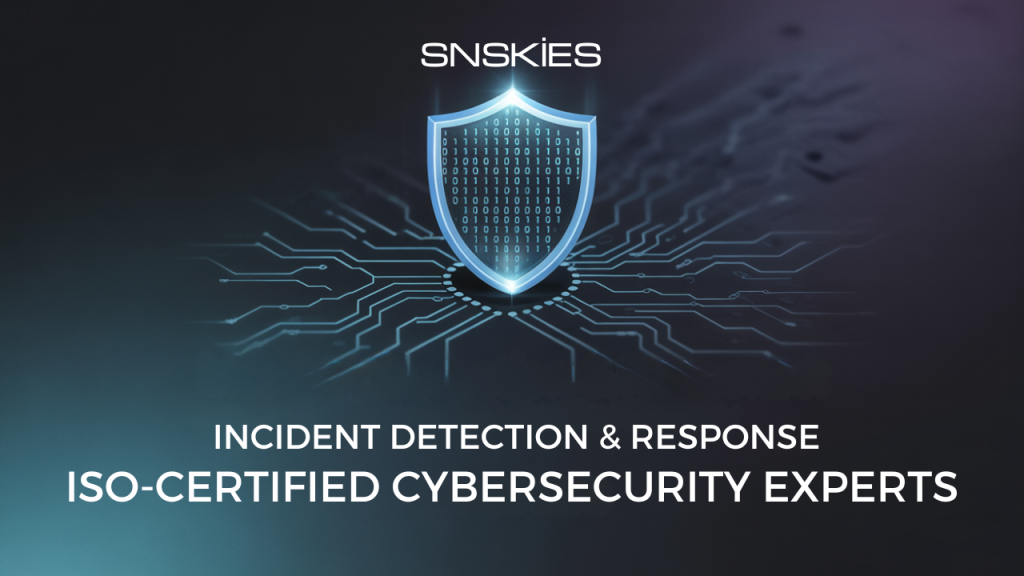
Articles Digital Forensics and Incident Response Certifications Articles Digital Forensics and Incident Response Certifications Articles June 10, 2025 Introduction to Incident Detection & Response When it comes to cybersecurity, Incident Detection & Response is the lifeline that protects businesses from collapsing under digital threats. This powerful duo is all about identifying threats early and responding effectively — before any real damage is done. At SNSKIES, our approach to Incident Detection & Response is not only robust but also ISO 27001:2022 and ISO 27701:2019 certified — ensuring the highest levels of security and privacy compliance for every client we serve. What is Incident Detection? Incident detection refers to the real-time identification of suspicious or unauthorized activities across your systems, networks, or devices. At SNSKIES, we treat detection as the first line of defense in our Incident Detection & Response strategy. What is Incident Response? Incident response involves the structured process of handling, containing, eradicating, and recovering from a security event. Together with incident detection, it forms a complete shield that mitigates threats before they escalate. Why Incident Detection & Response is Critical Incident Detection & Response is like a fire alarm system that not only detects smoke but also activates sprinklers and guides everyone to safety. Delays in either detection or response can lead to data loss, system downtime, and massive regulatory penalties. Importance of a Well-Planned Incident Detection & Response Strategy 1. Faster Breach Detection Reducing the “dwell time” of threats ensures minimal damage. 2. Reduced Financial & Legal Risks Having an ISO-certified IDR system helps reduce legal penalties by ensuring proper documentation and response. 3. Brand Reputation Management With SNSKIES’ proactive approach to Incident Detection & Response, your customers’ trust remains intact even during attacks. Core Components of Incident Detection Security Monitoring We use advanced monitoring tools to ensure real-time visibility across networks. Threat Intelligence SNSKIES integrates live threat intel feeds into our Incident Detection & Response systems to identify known and unknown threats. Anomaly Detection Behavior-based analysis enables us to spot abnormal patterns and suspicious activities with high accuracy. Key Steps in Incident Response Identification and Containment Stop the threat from spreading — isolate the affected systems immediately. Eradication and Recovery Remove malware, backdoors, or compromised accounts. Then restore operations with confidence. Post-Incident Analysis A mandatory part of our ISO-driven Incident Detection & Response model. We analyze, report, and improve after every incident. ISO 27001:2022 & ISO 27701:2019 – Why They Matter ISO 27001:2022 This is the gold standard for Information Security Management Systems (ISMS). At SNSKIES, every Incident Detection & Response process is rooted in this framework, ensuring that your digital assets are handled with discipline and control. ISO 27701:2019 Focused on Privacy Information Management, this certification ensures that incident response activities respect data privacy laws like GDPR — something SNSKIES takes very seriously. Together, these certifications make SNSKIES’ Incident Detection & Response services globally compliant and trustworthy. Technologies Behind Our Detection & Response SIEM (Security Information and Event Management) A centralized system to log and correlate events in real time. SOAR (Security Orchestration, Automation and Response) Automates repetitive tasks and ensures fast, consistent responses. AI & Machine Learning Our intelligent Incident Detection & Response platforms adapt and learn from each incident — getting smarter every time. Common Cyber Incidents We Tackle Ransomware & Malware Attacks Phishing & Email Scams Insider Threats & Data Leakage DDoS & Network Flooding Attacks Each of these threats is handled by SNSKIES under a certified Incident Detection & Response framework, tailored to your business environment. SNSKIES’ Unique Approach to Incident Detection & Response Integrated Threat Lifecycle We don’t just react — we monitor, detect, respond, and evolve. Certified to the Core Our dual ISO certifications ensure that everything — from investigation to post-mortem reporting — is done to the highest international standards. Real-Time Response Capability We operate a 24/7 Security Operations Center (SOC) that ensures rapid response whenever and wherever a threat is detected. Challenges in Modern Incident Detection & Response Too Many False Positives Zero-Day Exploits Cloud Infrastructure Complexity Remote Workforce Security Gaps SNSKIES meets these challenges head-on with AI-driven analytics, certified processes, and a seasoned response team. Best Practices for Incident Detection & Response Conduct quarterly drills & simulations Update response playbooks regularly Invest in threat intelligence tools Maintain a trained, agile incident response team SNSKIES helps organizations apply these best practices with the backing of ISO 27001:2022 and ISO 27701:2019 frameworks. Regulatory Benefits of ISO-Certified Incident Detection & Response Regulations like GDPR, HIPAA, and PCI-DSS demand swift, auditable responses. Our certified approach not only meets those needs but often exceeds them. Documentation? Compliance? Peace of Mind? Future of Incident Detection & Response The future lies in proactive cybersecurity. SNSKIES is building toward: Predictive Threat Hunting Automated Playbook Execution Self-Healing Systems AI-driven breach forensics And we’re already implementing many of these in live environments today. Conclusion In a world full of evolving cyber threats, relying on basic security is no longer enough. You need a partner who understands Incident Detection & Response like second nature. At SNSKIES, we bring the full power of ISO 27001:2022 and ISO 27701:2019 certified systems, proactive monitoring, and elite response teams to protect what matters most — your data, your systems, and your reputation. Recent Post All Posts Articles ISO Certified Managed SOC UAE: A Complete Guide to Secure Your Business June 13, 2025/ ISO Certified Company Services in Dubai, UAE: Your Guide to Compliance and Quality by SNSKIES June 11, 2025/ Digital Forensics and Incident Response Certifications June 10, 2025/ Older Posts